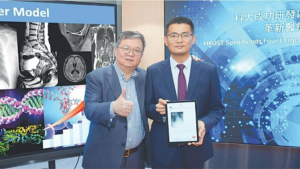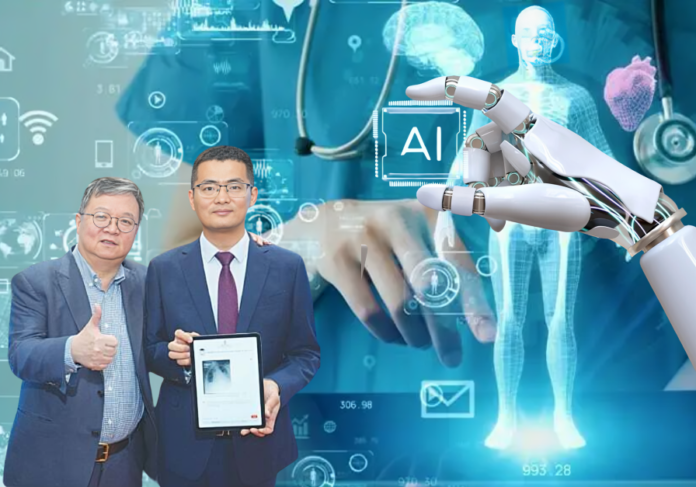AI medical diagnosis is rapidly transforming the healthcare sector, reducing diagnostic time, and enhancing the accuracy of medical treatments. This cutting-edge technology leverages artificial intelligence (AI) to analyze vast amounts of medical data, providing healthcare providers with faster and more precise insights.

The potential to reduce disease detection time by up to 40% could revolutionize patient care, leading to earlier interventions, more accurate diagnoses, and ultimately better health outcomes. With AI tools such as Medical ChatGPT, the healthcare industry is poised for a major leap forward in improving the speed and efficiency of disease detection.
The Role of AI Medical Diagnosis in Modern Healthcare
AI medical diagnosis is a technology designed to assist healthcare professionals by analyzing data such as medical records, lab results, and imaging to provide faster and more accurate diagnoses. This breakthrough tool reduces the time traditionally spent in diagnostic procedures and has proven to be essential in providing quicker treatment options for patients.
Key Benefits of AI Medical Diagnosis:
- Faster Disease Detection: AI systems can process medical data in seconds, significantly reducing the time needed for disease diagnosis.
- Improved Accuracy: By analyzing large datasets and patterns, AI tools can identify conditions that might be missed by human doctors.
- Personalized Treatment: AI systems analyze patient history, genetics, and lifestyle factors to recommend personalized treatment plans.
How AI Medical Diagnosis Enhances Disease Detection Time
AI systems are programmed to analyze medical data more quickly and accurately than traditional diagnostic methods. By using advanced machine learning algorithms, AI can identify patterns in patient data that might be too complex or subtle for humans to detect in time.
Key Features of AI in Disease Detection:
- Medical Imaging Analysis: AI algorithms can rapidly interpret medical images such as X-rays and MRIs, reducing analysis time and allowing for faster diagnosis of conditions like cancer or fractures.
- Pattern Recognition: AI can identify early signs of diseases such as cancer, heart disease, or neurological disorders, even in their earliest stages, which may be missed during manual reviews.
- Predictive Analytics: AI can use patient data and historical trends to predict the likelihood of disease progression, enabling timely intervention.
Through these capabilities, AI medical diagnosis has been shown to reduce detection time by approximately 40%, accelerating the path from diagnosis to treatment and improving the chances of a successful recovery.
Impact of AI Medical Diagnosis in Personalized Healthcare
Personalized healthcare has been made possible by AI, offering treatments that are tailored to each patient’s individual health profile. AI systems go beyond generic treatment protocols by considering genetic data, lifestyle factors, and specific health conditions, enabling healthcare providers to create customized treatment plans.
AI’s Role in Personalized Treatment:
- Customized Treatment Plans: By analyzing genetic and medical data, AI can recommend treatment options that are most likely to work for the individual patient, enhancing the chances of success.
- Improved Decision-Making: AI tools help doctors by providing evidence-based recommendations, reducing the likelihood of errors in judgment.
- Continuous Learning: As AI systems learn and adapt from ongoing data, treatment recommendations continue to evolve, ensuring that patients receive the most up-to-date care.
This personalized approach not only speeds up diagnosis but also ensures that patients receive treatments specifically suited to their unique needs, which leads to better health outcomes and reduces the risk of unnecessary side effects.
Medical ChatGPT: AI at the Forefront of Diagnostics
Medical ChatGPT, an advanced AI-powered diagnostic assistant, is playing a pivotal role in revolutionizing how doctors diagnose diseases. By using machine learning and natural language processing (NLP), Medical ChatGPT processes large datasets, medical research, and patient histories to generate quick and reliable diagnostic insights.
How Medical ChatGPT Works:
- Data Integration: Medical ChatGPT integrates patient data, including medical records and lab results, to offer doctors diagnostic suggestions in real time.
- Real-Time Assistance: Doctors can interact with the system during consultations, asking questions and receiving instant answers, improving the speed and accuracy of diagnoses.
- Differential Diagnosis: Medical ChatGPT helps doctors consider multiple potential diagnoses by cross-referencing patient data with a large medical database, ensuring that no condition is overlooked.
By offering this type of real-time diagnostic assistance, Medical ChatGPT supports healthcare professionals in making faster, more informed decisions, which can significantly reduce diagnostic delays.
AI Medical Diagnosis: Improving the Quality of Healthcare
The integration of AI medical diagnosis into healthcare systems goes beyond just speed; it also enhances the quality of care patients receive. With AI’s ability to analyze and interpret vast amounts of data, it can highlight potential health risks that might otherwise be ignored, leading to more accurate and timely interventions.
Key Ways AI Improves Healthcare Quality:
- Early Detection: AI can spot early-stage conditions, leading to earlier intervention and improving the likelihood of successful treatment.
- Reduced Human Error: AI systems can analyze data without fatigue or bias, ensuring more reliable results than traditional methods.
- Improved Healthcare Access: AI can be used in remote or underserved regions, offering diagnostic assistance to doctors who may have limited resources or training.
These improvements contribute not only to faster detection but also to more effective treatment outcomes, as healthcare providers are able to act quickly on the insights provided by AI systems.
Challenges in Implementing AI Medical Diagnosis
While AI medical diagnosis holds tremendous promise, its widespread adoption faces several challenges. One of the primary concerns is ensuring that these systems are free from biases that could lead to misdiagnosis or unequal treatment. Rigorous testing, ongoing research, and careful validation are necessary to ensure that AI systems are safe, effective, and equitable.
Addressing the Challenges:
- Bias in AI Algorithms: Ensuring that AI systems are trained on diverse datasets to avoid biases that could lead to inaccurate or unfair diagnoses.
- Training for Healthcare Professionals: Doctors and healthcare staff must be trained to use AI tools effectively, integrating them into their practice without relying on them entirely.
- Data Privacy and Security: Safeguarding patient data is critical, especially when it comes to AI-powered tools that access sensitive medical records.
Addressing these challenges will require collaboration between AI developers, healthcare providers, and policymakers to ensure that AI medical diagnosis can be safely and effectively integrated into the global healthcare system.
The Future of AI Medical Diagnosis
The future of AI in medical diagnosis looks incredibly promising. As technology continues to evolve, AI systems will be able to analyze even larger datasets, recognize more complex patterns, and offer more sophisticated insights into patient health.
Emerging Trends:
- Integration with Wearable Devices: AI could be integrated with wearable health devices to monitor patients in real time, offering instant alerts if a health issue is detected.
- Expanded Diagnostic Capabilities: AI will likely expand its reach into even more medical fields, such as dermatology, ophthalmology, and mental health, providing quicker and more accurate diagnoses.
- Global Health Impact: AI medical diagnosis can help address healthcare disparities in low-resource settings, where access to trained medical professionals may be limited.
In the coming years, the role of AI in healthcare is expected to grow exponentially, offering not just speed and accuracy but also broader access to quality care.
AI medical diagnosis is a transformative technology that has the potential to reduce disease detection time by up to 40%, revolutionizing how healthcare is delivered. By enabling faster, more accurate diagnoses, personalized treatment plans, and improved healthcare access, AI is paving the way for a new era of medicine.
While challenges remain, the future of AI in healthcare is bright, and its continued development promises to save countless lives by ensuring earlier and more effective treatment for patients worldwide.



